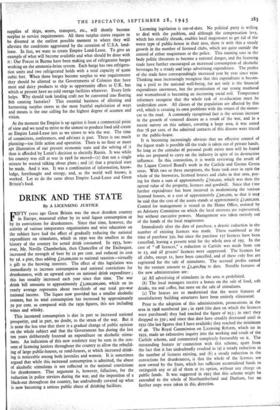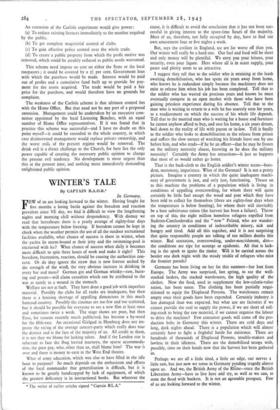DRINK AND THE STATE
By A LICENSING JUSTICE
ElIFTY years ago Great Britain was the most drunken country r in Europe, measured either by its total liquor consumption or by its convictions for drunkenness. Since that time, however, the activity of various temperance organisations and wise education on the subject have had the effect of gradually reducing the national expenditure on stimulants, which in 1930 was the smallest in the history of the country for actual drink consumed. In 1933. how- ever, Mr. Neville Chamberlain, then Chancellor of the Exchequer, increased the strength of beer by to per cent. and reduced its cost by id. a pint, thus adding £20,000,000 to national taxation—virtually a gift to the brewing interests. The effect of this legislation was immediately to increase consumption and national convictions for drunkenness, with an upward curve on national drink expenditure ; this has steadily increased each year since that time. The war drink bill amounts to approximately £3,000,000,000, which on its yearly average represents about two-thirds of our total pre-war national income. The liquor now provided has a smaller alcoholic content, but its total consumption has increased by approximately 5o per cent. as compared with the 1930 figures, this not including wines and whisky.
This increased consumption is due in part to increased national prosperity, and in part, no doubt, to the strain of the war. But it is none the less true that there is a gradual change of public opinion on the whole subject and that the Government has during the last ten years deliberately fostered an expenditure on alcoholic stimu- lants. An indication of this new tendency may be seen in the con- sent of licensing justices throughout the country to allow the rebuild- ing of large public-houses, or road-houses, at which increased drink- ing is noticeable among both juveniles and women. It is sometimes argued that while this increased consumption is admitted, the abuse of alcoholic stimulants is not reflected in the national convictions for drunkenness. That argument is, however, fallacious, for the reduction in police services during the war, and the imposition of a black-out throughout the country, has undoubtedly covered up what is now becoming a serious public abuse of drinking facilities. Licensing legislation is out-of-date. No political party is willing to deal with the problem, and although the compensation levy, which has steadily shrunk, enables local magistrates to get rid of the worst type of public-house in their area, there is with this a steady growth in the number of licensed clubs, which are quite outside the control of either magistrates or the police. This running sore in the body politic threatens to become a national danger, and the licensing trade have further encouraged an increased consumption of alcoholic beverages by a steady and large advertising expenditure. The profits of the trade have correspondingly increased year by year since 1930.
Thinking men increasingly recognise that this expenditure is becom- ing a peril to the national well-being, for not only is the financial expenditure enormous, but the prostitution of our young manhood and womanhood is becoming an increasing social evil. Temperance reformers recognise that the whole task of re-education must be undertaken anew. All classes of the population are affected by this evil, which is creating its own problems with the return of the motor- car to the road. A commonly recognised fact is the serious increase in the growth of venereal disease as a result of the war, and in a recent survey on this subject, covering a large area, it was stated that 78 per cent. of the admitted contacts of this disease were traced to the public-house.
It is becoming increasingly obvious that no effective control of the liquor trade is possible till the trade is taken out of private hands. So long as the stimulus of personal profit exists men will be found who are prepared to carry on the industry in spite of its destructive influence. In this connection, it is worth reviewing the result of the Liquor Control Board's work in the Carlisle and Gretna Green areas. With two or three exceptions, the State took over in 1916 the whole of the breweries, licensed houses and clubs in that area, pay- ing for them a sum of approximately £700,000, which was then the agreed value of the property, licences and goodwill. Since that fine further expenditure has been incurred in modernising the various licensed houses, at a cost of approximately £300,000, so that it may be said that the cost of the assets stands at approximately £1,000,000. Control for management is vested in the Home Office, assisted by an Advisory Committee on which the local interests arc represented, but without executive powers. Management was taken entirely out of the hands of the local magistrates.
Immediately after the date of purchase, a drastic reduction in the number of existing licences was made. These numbered at the time of purchase 35o, but since the purchase 157 licences have been cancelled, leaving a present total for the whole area of 193. In the case of " off licences," a reduction in Carlisle was made from too to 13, and all grocers' licences were suppressed. The licences for all clubs, except it, have been cancelled, and of these only five are registered for the sale of stimulants. The accrued profits earned by the venture amount to £2,400,894 to date. Notable features of the new administration are: (a) All advertising of stimulants in the area is prohibited.
(b) The local managers receive a bonus on the sale of food, soft drinks, tea and coffee, but none on the sale of stimulants.
(c) The houses are so modernised that the worst features of unsatisfactory building structures have been entirely eliminated.
Prior to the adoption of this administration, prosecutions in the area in 1908 numbered Soo ; in 1916 (the date on which the licences were purchased) they had reached the figure of 953; in 1917 they dropped to 35o ; and since that date have steadily decreased until in 1932 (the last figures that I have available) they reached the minimum of 49. The Royal Commission on Licensing Reform, which sat in 1932, made an exhaustive inquiry into the working and result of the Carlisle scheme, and commented completely favourably on it. The outstanding feature in connection with this scheme, apart from the fact that it has undoubtedly resulted in (a) a steady reduction in the number of licences existing, and (b) a steady reduction in the convictions for drunkenness, is that the whole of the licences are now owned by the State, which has sufficient accumulated funds to extinguish any or all of them at its option, without any charge on public funds. It was suggested in 1925 that this scheme might be extended to the whole of Northumberland and Durham, but no further steps were taken in this direction.
An extension of the Carlisle experiment would give power: (a) To reduce existing licences immediately to the number required by the public.
(b) To get complete magisterial control of clubs.
(c) To gain effective police control over the whole trade.
(d) To create a public property from which the profit motive was removed, which could be steadily reduced as public needs warranted.
This scheme need impose no cost on either the State or the local ratepayers ; it could be covered by a 21- per cent. Government loan with which the purchase would be made. Interest would be paid out of profits and a cumulative fund built up to provide for pay- ment for the assets acquired. The trade would be paid a fair price for the purchase, and would therefore have no grounds for complaint.
The weakness of the Carlisle scheme is that ultimate control lies with the Home Office. But that need not be any part of a proposed extension. Management could be undertaken by an executive com- mittee appointed by the local Licensing Benches, with an equal number of Home Office representatives. If it was found that in practice this scheme was successful—and I have no doubt on this point myself—it could be extended to the whole country, in which case disinterested management would replace private ownership, and the worst evils of the present regime would be removed. The drink evil is a direct challenge to the Church, for here lies the only power capable of creating the necessary public opinion to change the present evil tendency. No development is more urgent than this at the present time, and nothing more immediately demanding enlightened public opinion.



























 Previous page
Previous page